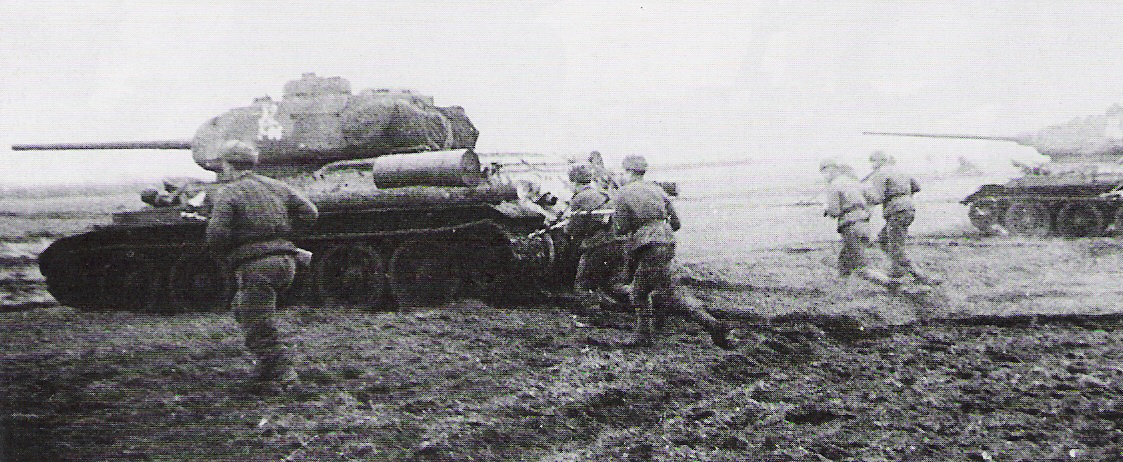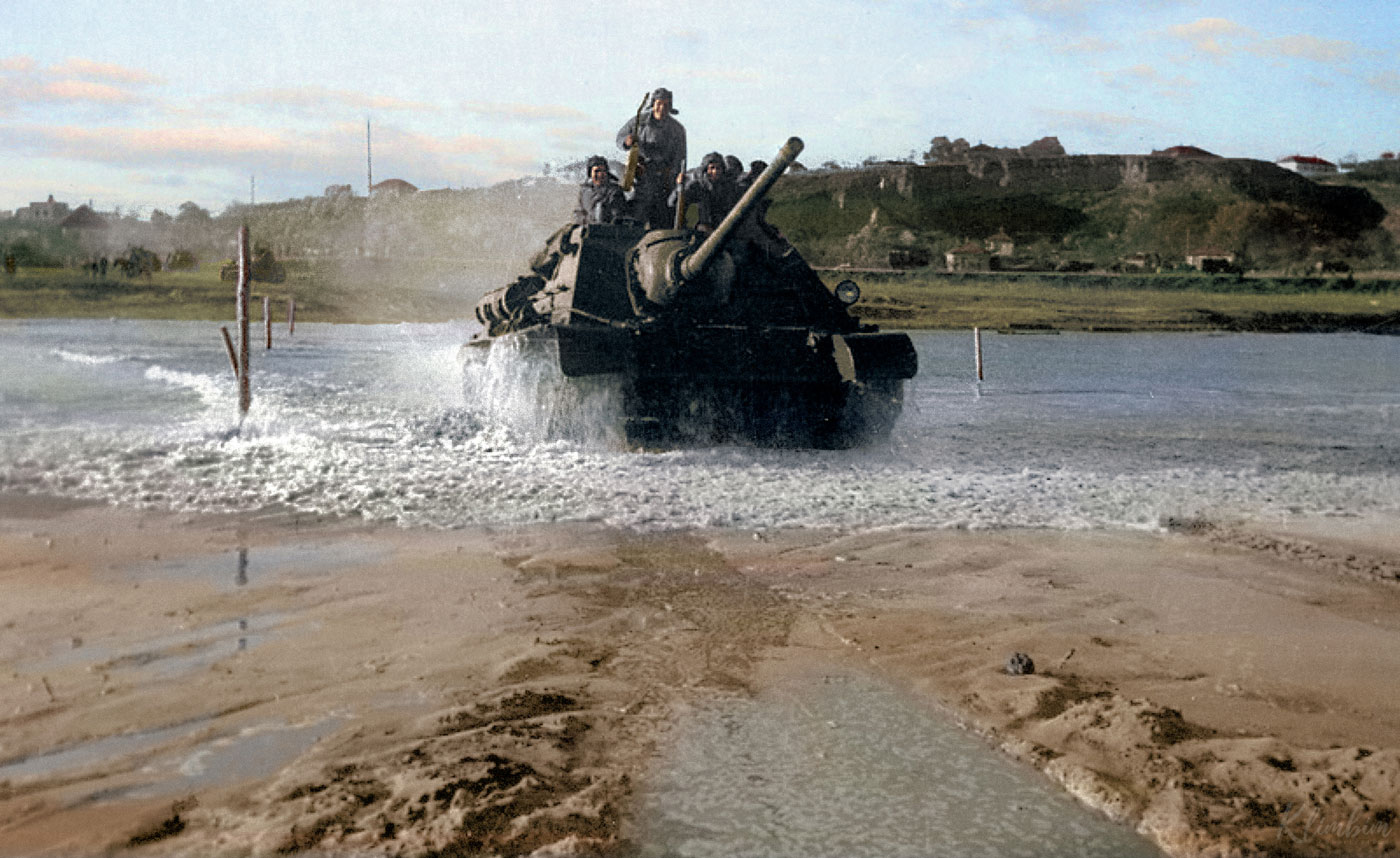OK sitting corrected about the quality of the Volksgrenadier units their still only a couple of divisions and Germany is so stretched for willing manpower.
It was such a close run operation IOTL that all it takes is a couple of divisions to matter given how stretched the Soviets were at that place and time.
As you say they managed in a defensive position to destroy a lot of the armour of the 3rd Ukrainian Front but that was on the defensive and how quickly was that armour replaced with Soviet production levels?
Not in a defensive position, they were attacking during Operation Konrad III. They were counterattacked during their offensive repeatedly and defeated all comers.
Though wikipedia is usually a poor source, the write up in broad strokes is actually ok for this specific operation:

en.wikipedia.org
Enjoying the support of German
airpower, the attack of the IV SS Panzer Corps achieved complete surprise, the Soviet 4th Guards Army being overrun in less than two days as the
3rd and
5th SS Panzer Divisions, well-equipped with
Panther tanks qualitatively superior to the
T-34s of the Soviets, destroyed many Soviet
tanks in quick succession. The Soviet
18th Tank Corps and
130th Rifle Corps were
encircled and a
counterattack by the
7th Mechanized Corps was crushed by the SS tanks. The Germans lacked the
infantry to quickly reduce the pockets and much of the Soviet forces were able to break out. By the end of the first day, a breach 30 kilometers wide and 60 kilometers deep was created in the Soviet
front line and the SS tanks reached the
Danube on 19 January, splitting in two the Soviet forces in Transdanubia. By 21 January, the Germans had captured 400 square kilometers of territory, an achievement comparable to the initial German gains during the
Ardennes Offensive on the
Western Front in December 1944.
[7]
Granted though this is with a different force at a later date than I'm taking about in OP, the Zamoly operation was somewhat similar. It took until mid-March for the armor to be mostly replaced IIRC.
As far as the Zamoly operation, this article is largely based on a write up from a translated Russian history of the campaign by Issaev:
This website is for sale! weaponsandwarfare.com is your first and best source for all of the information you’re looking for. From general topics to more of what you would expect to find here, weaponsandwarfare.com has it all. We hope you find what you are searching for!

weaponsandwarfare.com
The attack of the Breith Group – the southern branch of Operation Konrad II – met fierce resistance, and ran out of steam as early as 9 January. On the same day the Soviet 7th Mechanised Corps launched a strike to prevent a German breakthrough, but 57 of its 80 tanks were put out of action. In three days of fighting the fields of Zámoly became a veritable tank cemetery. With great losses on both sides the Germans made no further progress, but their salients remained in place.
The above is particularly important, because it shows just how much of a difference 10000 extra infantry would have on the operation. Especially because most of 1st Panzer didn't participate, just elements of its armor. Of course you'd also have to factor in the Soviet 84th RD's strength, which was around 5000 IIRC. Not sure how much infantry the rest of 1st Panzer had though, so that would also boost German numbers.
Always assuming that the western allies actually know about larger losses for the Soviets

it still doesn't alter Stalin's position much. FDR wants Soviet support in the Pacific and will agree to his terms to get it. I have even seen references that he favoured a Europe split between US and Soviet zones of control/influence rather than a number of independent states as he thought the former would be less likely to result in a future war.
They would because they had SOE and OSS agents in Hungary:
And they had their own sigint monitoring Soviet radio traffic:

en.wikipedia.org
As the NKVD was doing the accurate reporting of so much of what was going on in the USSR, they'd have the true figures.
Not sure why you think it wouldn't alter Stalin's position much if he's had major elements of his forces destroyed and Soviet strength falling through 1945. Overall strength fell by 1.5 million men from January-May 1945 after suffering 3 million casualties. These casualties would be on top of that 3 million and many of those units would not be able to be rebuilt during the war due to Soviet manpower depletion and how hard it was to replace specialist and experience manpower and leaders, not to mention stand up entirely new corps. The Soviets were tapped out except for being able to funnel sub-par manpower as replacements into existing units.
The prime example of how limited they were in terms of being able to replace destroyed corps level and higher units:
Mechanised Corps represented the most expensive divisional sized combat units in the Red Army yet we know relatively little about how they were organised and equipped. Although only a small number of these corps were raised, they were important indicators as to STAVKAs strategic intentions as Mechan

www.hgwdavie.com
This is the reason that Mechanised Corps were used as assault forces because their large, relatively mobile lorry-borne infantry force, supported by tanks offered a good combination of offensive capability coupled with the potential for rapid exploitation and the ability to hold those positions once captured. Yet this capability was expensive to build and maintain, consuming scarce resources at a frightening rate and so the Main Directorate of Armoured and Mechanised Troops of the Red Army concentrated on maintaining the existing units and did not create new ones.
......
Just like the Apostles, there were only ever 13 Mechanised Corps in the Red Army. Their forerunners were all destroyed or disbanded in the initial German advance of June 1941 and when the Red Army came to reform them in September 1942 just six of these divisional sized units were raised. A further two Guards Corps were formed in November, followed by three more Corps and a further Guard Corps in January 1943 and a final one in June 1943. With four regular Corps converted to Guard Corps during 1943, this gave a total of five Corps and eight Guard Corps by the end of the year.
So by 1943 they were at the limit of what they could form and by 1945 even though equipment replacement wasn't an issue with enough time allowed for refitting, the problem was the quality personnel needed to form the units, which was effectively tapped out by the end of the war. Replacements could be had for the combat formations, but if the entire unit were encircled and destroyed the ability to generate a replacement corps level formation was impossible given that the necessarily experienced officers/leaders/technical personnel were so highly fungible and limited for a variety of reasons.
FDR wanted Stalin's support in the East, but if Stalin is unable to provide it due to suffering major losses in Europe, much more than IOTL, and the war drags out longer than IOTL, then Stalin loses his leverage and FDR/Truman the willingness to tolerate Stalin's BS.
As such I can't see, even if heavy losses are inflicted on a couple of Soviet fronts, which isn't the same as their destruction, it greatly altering the political balance in post war Europe or even the duration of the conflict. Things might drag on a bit longer and more people will die but the German position is hopeless by now and the US wasn't interest in making a desperate dash for Berlin, nor really in much position to. The only way something like this could happen would be if you got:
a) Hitler's removal
b) followed by a de facto agreement between the western powers and most elements of the rump German regime to allow the former to advance largely unopposed while the Germans fight as hard as possible in the east.
Of course this would greatly offend Stalin, along with a lot of public opinion in the west where he and the Soviet Union have been glorified for the last few years. Unless of course, as is quite possible, the US then betrays the 'informal agreement' and withdraws from territory to give the Soviets the sort of occupation zone that occurred OTL.

Steve
The Fronts were their units and support units; even if the top command structure survives, but their rear area units are overrun and wiped out, then the Fronts are effectively destroyed. What that matters in/by February 1945 is that the Soviets can't do what they did historically in terms of carrying the main burden of defeating the German army; in fact the losses in equipment and supplies would give the Germans desperately needed items themselves, plus shorten their line, plus remove the ability of the Soviets to regenerate the larger formations, which permanently changes the balance of forces at the front. That means setting up additional opportunities to attack, forces the Soviets on the backfoot and become more defensive if not actually retreat a significant distance, plus delays the fall of important cities and the like.
Then you also have to consider the impact on Stalin, he was getting exceptionally nervous at this point and even ordered the west bank of the Danube evacuated during Operation Konrad III, but the Front commander disobeyed and fought it out, saving the situation for the Soviets. Ironically that same commander then wanted to abandon the west bank of the Danube in March during Spring Awakening and Stalin told him to hold otherwise the war would last another 5-6 months. So if Stalin's view was that major defeats at this point in the war would drag it out for months, the destruction of most of two Fronts would likely cause him to become vastly more cautious and let the Wallies do the heavy lifting for a while assuming he doesn't suffer his 1945 stroke and heart attack a couple of months early as a result. Heavy smoking and drinking has a tendency to cause issues especially when combined with major stress. Had he died or been incapacitated right around the same time as FDR then things get interesting politically.
Again too Yalta hadn't happened yet and Stalin might delay it even more ITTL if he's feeling politically weakened in the alliance as a result of the defeats. IOTL he wanted Budapest in his pocket before the conference started to have maximal bargaining power and ITTL he not only won't have that, but will have a much reduced influence in the Balkans as a result of losing major forces and the siege being broken. Plus if Operation Solstice works thanks to 6th Panzer Army and subsequent operations involving the IV SS Panzer Corps also inflict further defeats on Soviet forces or at least force a major retreat to more defensible lines for the Soviets to refit from, that would seriously delay the East Prussia operation and might well prevent Soviet victory there given that supply lines would remain open and Courland forces could be withdrawn and brought back to Germany much more easily, as there were still something like 200,000 men there at the end of the war, probably still 350,000 by February 1945, some of which were shipped back IOTL and helped defend Berlin and Germany in March-April.
There is another component to the scenario originally that involved the small solution for the Ardennes offensive, which would alter things enormously too, but that is beyond the scope of this narrow what if...the political fall out from that would of course have a huge impact on things as well if you wanted to incorporate that element.









